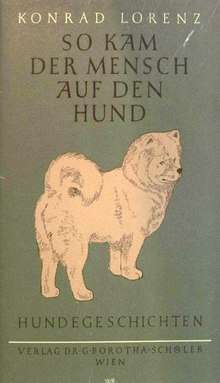Man Meets Dog

(publ. Verlag G. Borotha-Schoeler)
Man Meets Dog is a zoological book for the general audience, written by the Austrian scientist Konrad Lorenz in 1949. The first English-language edition appeared in 1954.
The original German title is So kam der Mensch auf den Hund, which could be literally translated as "How man ended up with dog". The German title is also a play on the phrase "Auf den Hund kommen", which is a common idiom in German-speaking countries and probably comes from the old days when farmers with economic problems had to sell their livestock animals and ended up with only the dog.
Contents
The opening chapter "How it may have started" deals with theories concerning the question where and when man first domesticated the predecessor of the modern dog. The book has a lot of interesting anecdotes of the author's experiences with dogs, these stories are often illustrated with simple drawings. Lorenz usually owned several dogs and many other animals and lived with them in his house near Vienna. There are also many insights into the behavior of cats and birds, though the focus is of course on the behavior of dogs.
Daniel Pinkwater refers amusingly to Man Meets Dog in his Uncle Boris in the Yukon and other shaggy dog stories,[1] stating among other things:
When I read Man Meets Dog, I had no way of knowing that the caraway seeds in Konrad Lorenz's sauerkraut had fermented and addled his brain. He put forth a theory that there are two races of dogs: Der Dogg, and Der Überdogg. No kidding ... and if Konrad had ever lived with a wolf, or a dog with strong wolf traits, he would have noticed that the ratio of dignified and heroic to downright silly is something like one to twenty. Standard for all dogs ... and humans.
References
- ↑ Pinkwater, D. (2001) Uncle Boris in the Yukon and other shaggy dog stories. New York: Simon & Schuster ISBN 0-684-85632-8